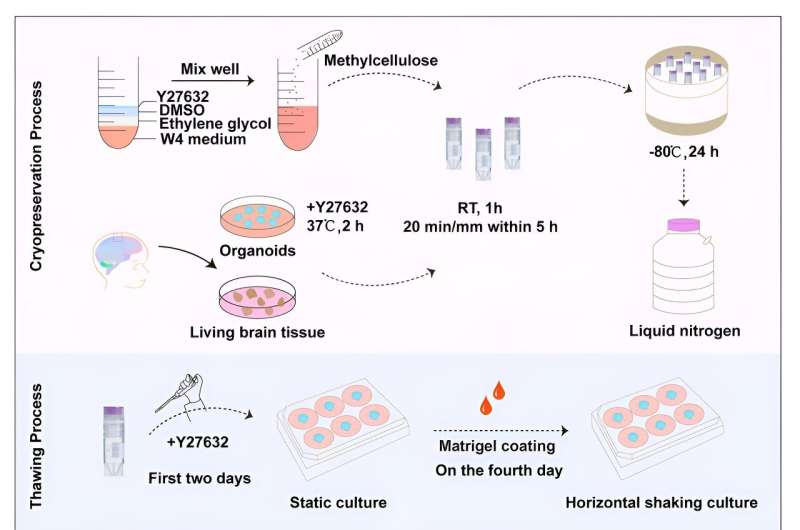May 17, 2024 report
This article has been reviewed according to Science X's editorial process and policies. Editors have highlighted the following attributes while ensuring the content's credibility:
fact-checked
peer-reviewed publication
trusted source
proofread
New technique to freeze brain tissue without harm

A team of medical researchers at the National Children's Medical Center, Children's Hospital, Fudan University, in China, has developed a technique to freeze and thaw brain tissue without causing damage.
In their study, published in the journal Cell Reports Methods, the group tested bathing brain organoid tissue in candidate chemicals before freezing them using liquid nitrogen.
Prior research has shown that no matter how quickly brain matter is frozen, the freezing and thawing process always causes tissue damage. This has made it more difficult for researchers to study brain matter because research must be conducted immediately after obtaining a tissue sample. In this new effort, the team in China found a way around this problem by soaking the tissue in a special solution before freezing.
The work involved dipping or soaking brain organoids (brain tissue grown from stem cells) in candidate compounds and then freezing and thawing them to see how they fared. After many attempts, they found one combination of solutions that worked best—a mix of ethylene glycol, methylcellulose DMSO and Y27632. They named the solution mix MEDY.
The research team then tested MEDY under a variety of conditions to see how well it prevented damage from freezing. The conditions involved changing variables, such as the age of the organoids prior to freezing and how long they were soaked in a MEDY solution. They then allowed the organoids to resume growing after they were thawed for up to 150 days.
The researchers found little difference between organoids that had been frozen and those that had not—even those that had been frozen for as long as 18 months.
As a final test, the research team used their technique on a sample of brain tissue obtained from a live human patient and found that it worked just as well.
The research team suggests that their technique should allow researchers to store brain tissue samples on a scale large enough to allow for new types of brain and nervous system research.
More information: Weiwei Xue et al, Effective cryopreservation of human brain tissue and neural organoids, Cell Reports Methods (2024). DOI: 10.1016/j.crmeth.2024.100777
© 2024 Science X Network





















